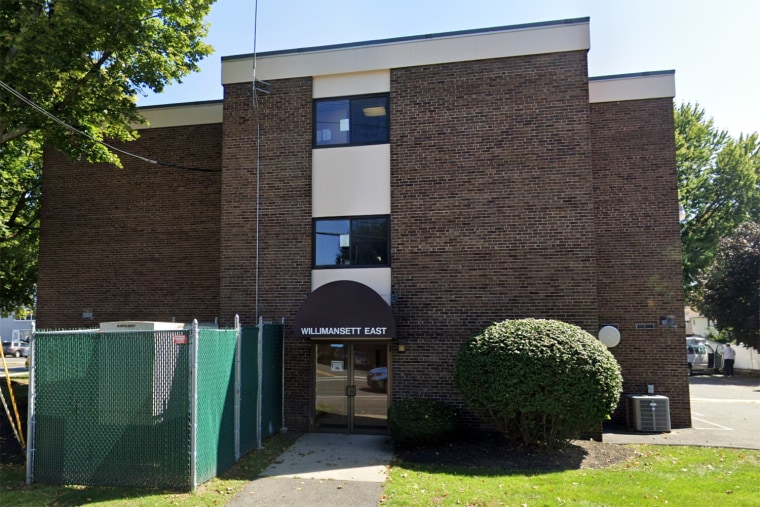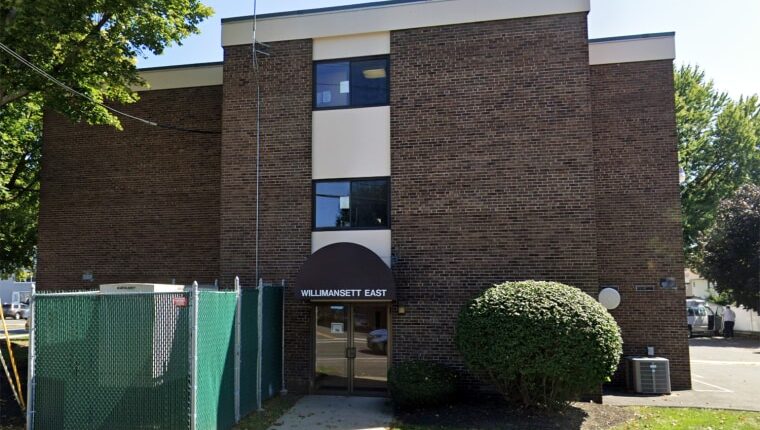Hundreds of elderly residents and people with disabilities from four nursing homes in western Massachusetts are quickly being displaced as the company that owns them appears to be accelerating the pace in which such centers stand to close down.
Sarah Vilanova, who is blind and is missing a leg, had been living in the Willimansett Center East nursing home in Chicopee for about a year and a half when staffers told her in February that she would be transferred the next day to another nursing home 45 minutes away.
Vilanova, a 48-year-old woman who is Puerto Rican, stood to be transferred to the same nursing home where she recalled having had “a bad experience,” making the news even more distressing.
“I started panicking and screaming,” Vilanova told NBC News. “I had a panic attack, totally blind, I was bumping into everything with the wheelchair.”
Willimansett Center East was the first of the four homes to shut down on March 17, even though the plan approved by the state’s public health department called “for closure of the Facility on or about June 6.”

The other three homes still in the process of closing down are Chapin Center, in Springfield; Governor’s Center, in Westfield; and Willimansett Center West, in Chicopee.
All four homes are owned by Northeast Health Group, a Florida-based company.
Vilanova got the news that she would be displaced shortly after Northeast Health Group informed state public health officials on Feb. 6 of their intent to close down the facilities.
The company blamed the closures on post-Covid state regulations approved on April 2021 requiring long-term care homes to not have more than two beds in each room starting May 2022.
The regulations were the result of public outcry over a Covid outbreak that killed 84 people at Holyoke Soldiers’ Home, a state-run facility for veterans. The outbreak resulted in criminal charges, which were later dismissed, and a $56 million settlement with the state, Reuters reported.
Massachusetts’ Department of Public Health (DPH) conducted a public hearing to discuss the closures of Willimansett Center East and West on March 1, and another one on March 2 to discuss the closures of Chapin Center and Governor’s Center.
During this period, advocates for elderly and disabled nursing home residents raised concerns over possible violations taking place during the closing process, citing the speed of the facilities’ closures.
Stavros Center for Independent Living, a social services organization helping people with disabilities, filed a complaint with the Massachusetts Office of the Attorney General on March 8.
Based on the organization’s visits to the facilities and the public hearings, the four nursing homes began the closure process several weeks before the Department of Public Health approved the closure plan, the complaint stated.
The organization pointed out that residents are being given little choice on where they can be transferred, something they say goes against state regulations.
“Some have been told they will be homeless if they do not accept proposed placements, often far from their communities and against residents’/families’ needs and choices,” the complaint states.
The complaint also states that many residents, family members and staff “are under the impression that facilities will close in early April.”
In response to an NBC News request for comment, according to the Department of Public Health, while a long-term care facility has to provide information about a proposed closure at least 120 days in advance, it’s not uncommon for a facility to close ahead of the proposed closure date.
The department is monitoring the closings and is working with the Executive Office of Elder Affairs’ Long-Term Care Ombudsman regarding any concerns, according to DPH, which also urged any family members to contact the long-term care ombudsman regarding specific concerns.
‘The damage has been done’
Staff at the remaining three nursing homes told NBC News they weren’t authorized to speak about the closures. Requests for comment were redirected to Northeast Health Group, but were not answered.
Heather O. Berchem, an attorney representing the company, also did not respond to phone calls and an email requesting comment.
The closure of these nursing homes comes at a time when not enough facilities exist to satisfy the need of elder and disabled residents in the area, Betty Tegel of Dignity Alliance Massachusetts, a coalition of groups working to improve long-term care, told NBC News.
For this reason, Dignity Alliance Massachusetts and Stavros have been urging the state to take control of the facilities during the closure process to ensure rules are being followed and families treated fairly.
With less than a dozen residents left to relocate, Brianna Zimmerman, a systems change advocate at Stavros, said the biggest hope right now would be to have the attorney general open an investigation.
“At this point, the damage has been done,” Zimmerman told NBC News.
The Massachusetts Office of the Attorney General did not immediately respond to a request for comment.
Violations to voluntary closure requirements at long‑term care facilities may result in fines and in extreme cases, jail time.
Vilanova describes that day in early February as the moment when, “basically, I became homeless and ended up in the hospital.”
Her panic attack sent her to the hospital for a few weeks. She is now out and living a nursing home in Southbridge, where she has been greatly missing her tight-knit group of friends from Willimansett Center East.
Vilanova has been blind since she was 29. After enduring complications from contracting Covid-19 in 2020, Vilanova lost her right leg, below her knee.
After the traumatic event, Vilanova found a home and a community in Willimansett Center East where she was able to heal.
She had three other close friends with whom she would listen to country music, drink coffee and share endless laughs. People in the nursing home would call them the “Golden Girls,” Vilanova said. “And now they take that away from me, and for me it’s hard.”
Tegel raised concerns over the transitional trauma most of the displaced residents have faced in the midst of these closures.
“They’ve been in a nursing home for so long. They knew the staff, they knew the routine. They’ve built all these relationships over the years,” she said. “Readjusting for a new placement is just devastating for everybody involved.”
Tegel added that statistics show these frail residents, especially if they have Alzheimer’s or other severe medical conditions, may not survive very long in a new setting.
Source: | This article originally belongs to Nbcnews.com










